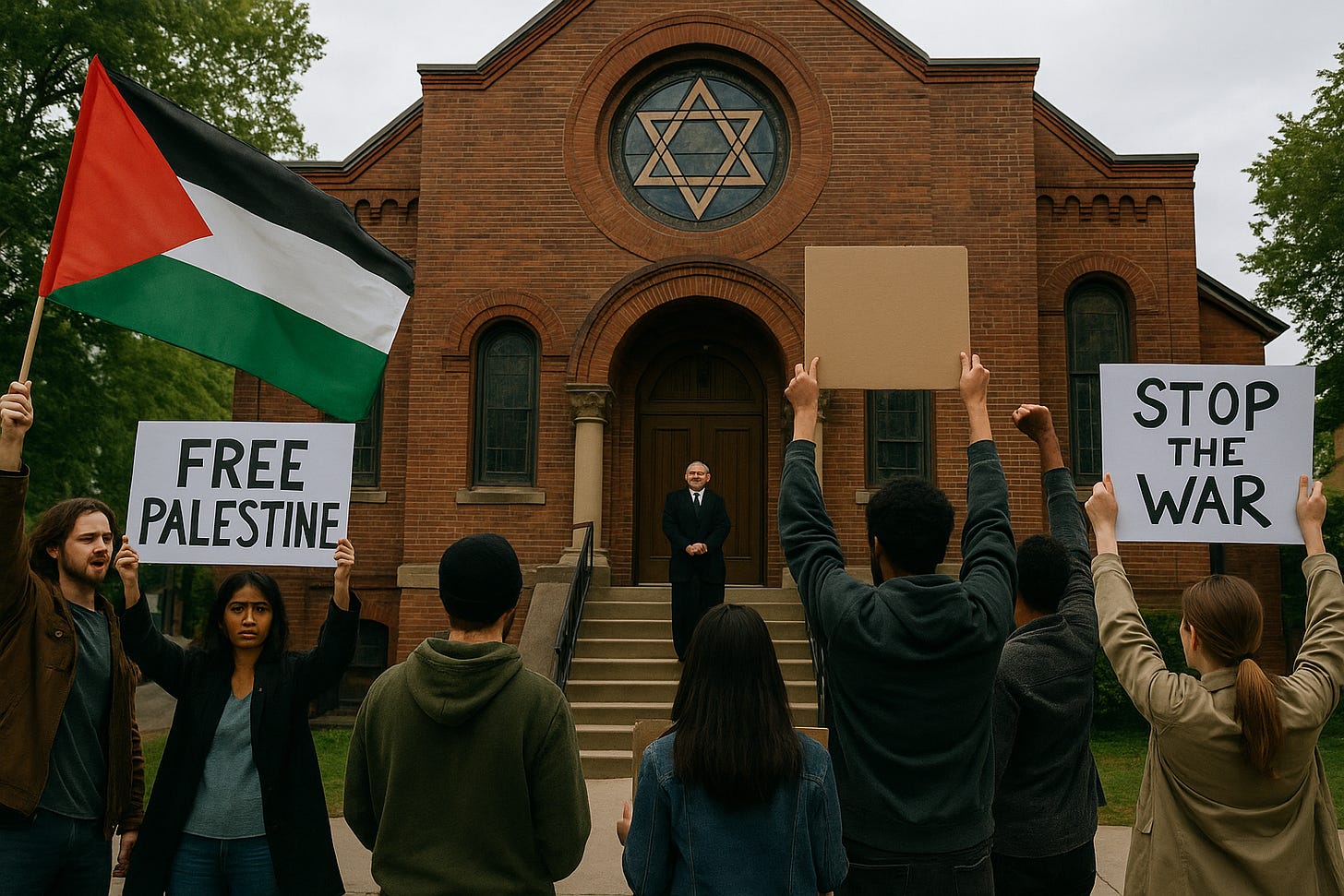Hate Masquerading as Protest
Nearly one in four Americans now say antisemitism is a “legitimate” form of protest. We can’t let that idea take root.
Two years after October 7, 2023, antisemitism is not only surging, it is being openly rationalized. A new national survey from Boundless shows that nearly 25% of Americans believe antisemitism is a legitimate form of protest in response to the Israel-Hamas War.
That should make every American stop in their tracks. Hatred of Jews is being rebranded as activism, woven into the culture of protest, and normalized in ways that make it far harder to confront.
Protest, But Against Whom?
I remember standing outside a synagogue last winter on a Friday night. Inside, families were gathering for Shabbat, while outside, a group of demonstrators had gathered. They waved flags, shouted slogans, and positioned themselves at the synagogue doors. Thankfully, security was present. The police were called - we had no choice.
Were these protestors confronting Israeli policy? No. They were confronting Jews who had nothing to do with the decisions of a foreign government. To those attending services, it was frightening and intimidating. To the protesters, it was “legitimate.”
Boundless’s new study also found that 38% of Americans say they don’t consider protesting outside synagogues antisemitic. That statistic tells us just how blurred the lines have become between dissent and scapegoating.
The Slippery Slope of Collective Blame
Nearly a third of Americans admit it’s hard to separate how they feel about Jews from what they have seen happening in Gaza. That’s how political anger bleeds into blame, of a religion, a people, a culture, and a community.
When people convince themselves that a vulnerable minority is a stand-in for distant conflicts, it gives license to target them here at home. This is especially so when the Jewish people are increasingly becoming used as a stand-in for the broader culture war between the far-left and far-right.
History has shown us where that path leads. Hatred begins to feel justified, and then spreads.
Criticism or Cover?
More than half of Americans - 53% - agree that criticism of Israel often becomes a cover for antisemitism. So people can see and identify the slippage. But awareness is not the same as accountability.
For the protester outside the synagogue, for the student demanding Jewish peers disavow Israel before joining a club, or for the vandal spray-painting “Free Gaza” on a JCC, a Holocaust memorial, or a synagogue, the distinction doesn’t matter. What matters is that hate finds - and has found - its excuse.
There is nothing wrong with protest. But when protest turns into overt hostility against neighbors, that becomes a problem.
What We Can Do
This is where despair can give way to strategy. We can respond. And if we can, we must.
Reclaim Our Space
Advocate for policies that protect Jewish religious and cultural spaces as off-limits to protest.
Host interfaith solidarity events so that allies and others are familiar with what happens in a synagogue. They can learn about our vibrant rituals, cultural events, and passion for education. We can use the space not just for teaching but even teaching about the space itself.
Educate
It is important that people - Jews and non-Jews alike - know that Israel is a sum of its parts and not defined solely for what has happened from October 7 to-date. This war has largely ended, and now we must be prepared to educate about what comes next.
Young Jews and students must be taken to the starting line of a broader education and conversation about what it is to be a Zionist. Equip them with books, like Gil Troy’s Why I am a Zionist, and encourage them to speak with their parents and grandparents about why they are Zionists, and about what Israel has meant to them in their lifetimes. This way, they cement their place in the Jewish story, and in the line of Jewish continuity. Then, they can be given simple, repeatable lines, to recite with conviction: “I’m proud to be Jewish,” “My connection to Israel is part of who I am,” “Being Jewish and being a Zionist are not things I’ll apologize for,” “Zionism is about self-determination, not about hating anyone else.”
Strengthen Coalitions
Partner with communities that have also been scapegoated: African-American, Asian, LGBTQ, immigrant. This may be easier said than done, as coalition-building can’t mean blind trust anymore. Too many of the same groups we once stood beside have turned their anger toward us. We rebuild alliances however not through slogans or protests, but through honesty, reciprocity, and shared moral boundaries.
As an example, this past Yom Kippur, Rabbi Elliot Cosgrove of the Park Avenue Synagogue welcomed Cardinal Dolan, the Archbishop of New York, to his pulpit to speak about the important Jewish-Catholic bond. Rabbi Cosgrove noted that his visit was “a statement that even in a world still plagued by hatred and misunderstanding, the bonds between our faith communities are strong, and the work of interfaith dialogue is not just theological, but deeply human.” This simple gesture and meaningful lesson, in a synagogue, speaks volumes about the importance of friends, and the need to combat ignorance.
Big Picture
We are witnessing a deep societal illness that demands a societal response - one that calls on civic leaders, educators, and ordinary citizens alike to be bolder, louder, and less afraid to stand up for what is right.
Antisemitism is no longer hiding in the shadows. It’s walking down Main Street, holding a protest sign, and calling itself ‘justice.’
We can’t let that stand.



